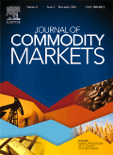
Journal of Commodity Markets
Scope & Guideline
Charting the Course for Informed Commodity Strategies
Introduction
Aims and Scopes
- Commodity Price Dynamics:
Exploration of factors influencing the volatility and predictability of commodity prices, including macroeconomic indicators, geopolitical events, and market sentiment. - Risk Management Strategies:
Analysis of risk management techniques such as hedging and diversification in commodity trading to mitigate price risks and enhance investment strategies. - Market Interconnectedness:
Research on the interconnections between commodity markets and other financial markets, including equities, currencies, and cryptocurrencies, focusing on spillover effects and causality. - Impact of External Events:
Examination of how external shocks—such as climate change, pandemics, and geopolitical tensions—affect commodity prices and market behaviors. - Innovative Methodologies:
Application of advanced econometric and machine learning techniques to analyze commodity markets, including time-series analysis, quantile regression, and copula models.
Trending and Emerging
- Climate Risk and Commodities:
There is a growing emphasis on understanding how climate-related risks impact commodity price dynamics, reflecting an increasing awareness of environmental factors in market analysis. - Cryptocurrency and Commodities Interactions:
The exploration of relationships between cryptocurrencies and traditional commodities is on the rise, driven by interest in digital assets and their potential role as hedging instruments. - Advanced Machine Learning Applications:
The application of machine learning and artificial intelligence in analyzing commodity markets is trending, as these technologies provide enhanced predictive capabilities and deeper insights into complex data patterns. - Geopolitical Risk Analysis:
Research focusing on the effects of geopolitical events—such as wars and trade disputes—on commodity prices is becoming increasingly relevant, especially in light of recent global tensions. - Behavioral Finance in Commodity Markets:
The incorporation of psychological factors and investor behavior into commodity market analysis is emerging as a significant theme, recognizing the influence of sentiment on price movements.
Declining or Waning
- Traditional Hedging Techniques:
Research on conventional hedging strategies has decreased as newer, more sophisticated methods emerge, reflecting a shift towards innovative approaches in risk management. - Basic Price Predictability Models:
Studies relying on simpler econometric models for price prediction are becoming less common, signaling a transition towards more complex, multi-factor models that incorporate broader datasets and advanced analytics. - Static Analysis of Commodity Markets:
The focus on static analyses without considering dynamic interactions and time-varying relationships has waned, as researchers increasingly recognize the importance of adaptive modeling in understanding market behaviors. - Regulatory Impact Studies:
Investigations into the effects of regulatory changes on commodity markets have diminished, potentially due to a saturation of findings in this area and a shift towards more pressing contemporary issues like climate risk. - Historical Commodity Price Trends:
Research centered on historical trends and patterns in commodity prices is declining, as the field is moving towards real-time analysis and future-oriented forecasting techniques.
Similar Journals
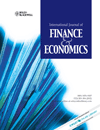
INTERNATIONAL JOURNAL OF FINANCE & ECONOMICS
Innovative Perspectives on Finance & EconomicsInternational Journal of Finance & Economics, published by Wiley, is a premier academic journal that serves as a vital resource for researchers and professionals in the fields of finance, accounting, and economics. With an impressive impact factor and a reputation for excellence, the journal is recognized in the 2023 Scopus rankings, placing in the top quartiles across multiple categories, including Q2 in Accounting, Economics, and Finance. The journal has been a significant contributor to academic discourse since its inception in 1996, with its converged years extending to 2024, thereby ensuring the continuous advancement of knowledge in these critical areas. Although it operates under a traditional subscription model, its comprehensive articles provide insightful analyses, empirical research, and theoretical advancements that cater to a diverse audience—from seasoned scholars to emerging students in the field.
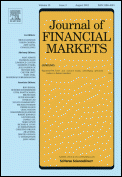
JOURNAL OF FINANCIAL MARKETS
Unveiling insights into economics and finance.Journal of Financial Markets, published by Elsevier, is a premier academic journal focusing on the theoretical and empirical aspects of financial markets. With its ISSN 1386-4181 and E-ISSN 1878-576X, this journal has solidified its reputation as a leading source in both the Economics and Econometrics and Finance fields, achieving a Q1 ranking in 2023 across these categories. Operating from Amsterdam, Netherlands, the journal not only highlights significant research developments but also fosters discussion on the implications of financial innovations and policy changes. The impact factor reflects its critical role among academic peers, contributing to the advancement of knowledge in financial systems and market behavior. Although not open access, the journal provides numerous subscription options for those eager to explore its wealth of resources and broaden their understanding of dynamic financial phenomena.
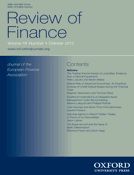
Review of Finance
Exploring the intersections of finance, accounting, and economics.The Review of Finance, published by Oxford University Press, stands as a premier academic journal in the fields of Finance, Accounting, and Economics. With an ISSN of 1572-3097 and an impressive track record stretching from 2001 to 2024, this journal is consistently recognized for its high-quality research, reflected in its Q1 rankings across key categories, including Accounting, Finance, and Economics and Econometrics. The Review of Finance is dedicated to advancing the understanding of financial phenomena through robust empirical and theoretical insights, making it an essential resource for researchers and professionals alike. Additionally, its strong Scopus rankings, placing it in the top percentiles, highlight its influence and relevance in ongoing academic discourse. Although the journal is not open access, it remains widely accessible through academic institutions, ensuring that its valuable contributions reach an extensive audience. The editorial board invites submissions that promise to further engage the academic community in the dynamic intersections of finance, accounting, and economic research.
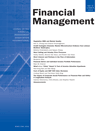
FINANCIAL MANAGEMENT
Exploring the Dynamics of Accounting, Economics, and FinanceFINANCIAL MANAGEMENT is a premier academic journal published by Wiley, focusing on the intricate domains of Accounting, Economics, and Finance. With an ISSN of 0046-3892 and an E-ISSN of 1755-053X, this esteemed journal has made significant contributions to the global discourse on financial practices and theories since its establishment in 1996. Situated within the top tier (Q1) in its respective fields, FINANCIAL MANAGEMENT ranks impressively in Scopus, positioned at 30 out of 176 in Accounting and 57 out of 317 in Finance, reflecting its high impact and relevance in the scholarly community. The journal is known for its rigorous peer-review process and publishes cutting-edge research aimed at advancing knowledge and practice in financial management. Although it does not offer Open Access, it remains accessible through institutional subscriptions, ensuring that researchers, professionals, and students remain at the forefront of developments in financial management. With a commitment to excellence, FINANCIAL MANAGEMENT continues to be an indispensable resource for those seeking to deepen their understanding of this critical field.
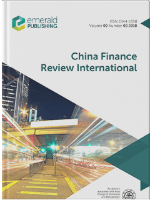
China Finance Review International
Navigating the Future of Finance in China and BeyondChina Finance Review International (ISSN: 2044-1398; E-ISSN: 2044-1401) is an esteemed journal published by Emerald Group Publishing Ltd, located in the United Kingdom. With a commendable Q1 ranking in the field of finance according to 2023 category quartiles, this journal has established itself as a leading platform for disseminating significant research in the realms of economics, econometrics, and finance, boasting a remarkable Scopus rank of #13 out of 317, placing it in the 96th percentile. The journal focuses on advancing the discourse surrounding financial issues related to China, making it essential reading for academics, professionals, and students eager to explore the dynamic shifts in this critical area of global finance. As it continues to bridge theoretical insights with practical applications, the China Finance Review International aims to foster a comprehensive understanding of financial mechanisms at play within one of the world's most impactful economies.

Quantitative Finance and Economics
Unlocking Financial Potential with Data-Driven ResearchQuantitative Finance and Economics, published by the American Institute of Mathematical Sciences (AIMS), is a pioneering open-access journal committed to advancing the fields of finance and economics. Established to disseminate high-quality research, this journal has been an open-access platform since 2017, promoting wider accessibility to vital academic findings. It serves as a crucial resource for researchers and professionals alike, offering valuable insights through rigorous studies in quantitative methods that influence financial and economic decision-making. Although current Scopus rankings indicate emerging challenges, with a rank in the lower percentiles across various categories, Quantitative Finance and Economics strives to gain recognition by bridging theoretical frameworks with practical applications. The journal invites contributions that explore innovative quantitative techniques and their implications in contemporary economic scenarios, thus underscoring its role in shaping discourse and research in this critical sector.
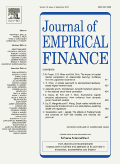
Journal of Empirical Finance
Empowering finance through rigorous empirical research.Journal of Empirical Finance, published by Elsevier, stands as a key resource in the areas of finance and economics, with a definitive focus on empirical studies. As a prominent journal since its inception in 1993, it has made significant strides in contributing to the academic community, evidenced by its soaring categorization in Q1 for Finance and Q2 for Economics and Econometrics as of 2023. With an ISSN of 0927-5398 and an E-ISSN of 1879-1727, the journal emphasizes robust, data-driven analysis to inform both theoretical and practical aspects of financial research. While access options do not include open access, the journal ensures that its content remains accessible to a diverse audience of researchers, professionals, and students. It fosters a platform for innovative research and discourse, significantly impacting the fields of finance, economics, and econometrics. The Scopus rankings further bolster its reputation, placing it in the 61st percentile in both categories, reflecting a commitment to high-quality research output. As the journal continues to evolve, it invites contributions that push the boundaries of empirical finance, enabling a deeper understanding of financial mechanisms that drive global economies.
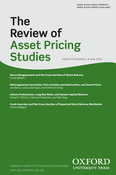
Review of Asset Pricing Studies
Connecting Theory and Practice in Asset PricingThe Review of Asset Pricing Studies, published by Oxford University Press, stands as a leading journal in the fields of Economics and Finance, recognized for its rigorous analyses and innovative research since its inception in 2011. This esteemed publication maintains an impressive impact factor and ranks in the Q1 category for both Economics and Finance as of 2023, consistently occupying top positions in Scopus rankings across its relevant categories. With a clear focus on advancing knowledge in asset pricing and investment strategies, the journal serves as a vital platform for researchers, professionals, and students seeking to contribute to and stay informed on the latest developments in these dynamic fields. Despite its lack of open access, the journal ensures wide circulation and accessibility through its reputable publisher, thereby fostering an engaged academic community.
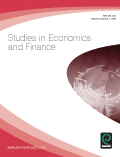
Studies in Economics and Finance
Navigating the intricacies of finance and econometrics.Studies in Economics and Finance is a distinguished journal published by Emerald Group Publishing Ltd, based in the United Kingdom. With an ISSN of 1086-7376 and an E-ISSN of 1755-6791, this journal has been a significant contributor to the fields of economics, econometrics, and finance since its inception, with coverage ranging from 1977 to the present. Ranked in the second quartile (Q2) for 2023 in its relevant categories, it holds a reputable position within the 83rd percentile in the general economics, econometrics, and finance fields according to Scopus rankings. This journal aims to disseminate cutting-edge research that addresses key issues and emerging trends in the economic and financial landscapes, fostering dialogue among scholars, practitioners, and policymakers. Although it does not operate under an Open Access model, Studies in Economics and Finance continues to be an essential resource for advancing knowledge and providing insights that are crucial for understanding complex economic behaviors and financial systems.
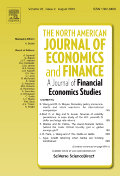
North American Journal of Economics and Finance
Elevating scholarship in economic and financial research.The North American Journal of Economics and Finance is a premier academic journal published by Elsevier Science Inc. since 1992, dedicated to advancing the field of economics and finance through rigorous research and scholarship. With an impressive impact factor and recognition in the Q2 category for Economics and Econometrics and Q1 for Finance as of 2023, this journal holds a significant position in the academic community, ranked #41 out of 317 in Finance and #100 out of 716 in Economics. The journal features high-quality, peer-reviewed articles that cover a broad range of topics, from theoretical frameworks to empirical analyses and practical applications. Though not an open-access platform, the journal provides valuable insights for researchers, practitioners, and students alike, promoting knowledge dissemination in the dynamic landscape of economic and financial studies. With its commitment to excellence, the North American Journal of Economics and Finance serves as an essential resource for those seeking to deepen their understanding of contemporary issues in these critical fields.